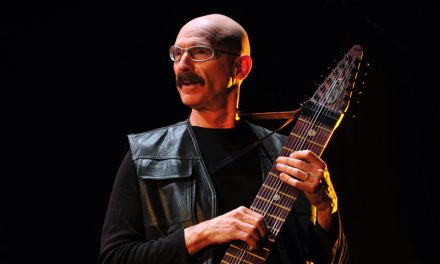American bassist Hansford Rowe began his career in the clubs of New York City. With French drummer Pierre Moerlen he reformed the jazz-rock group Gong. His current project is HRIII.
HRIII: Decadence
My second HRIII album, Decadence, is in production and again we are going with the business trend of the moment; crowd funding. Since my earliest days in the music business I have tried each decade’s solution to mixing art and commerce, never with much commercial success. First with majors in the 1970’s (Virgin and Arista) and on through indies, my own label (LoLo Records) and finally into today’s flea market of services.
Cream Rises to the Top?
In our current culture we tend to use commercial success as a measure of quality. You protest, but don’t we all believe that cream rises to the top, just a bit? Perhaps it’s a good measure if we think of music as an entertaining distraction among many others. But for artists who are lifers, or should I say long-term survivors, we absolutely know that this is not the case. Cream rises to the top? It may sometimes, and others not. Of course, no one knows about the submerged artists as they, by definition, are unheard of. And what of the cream that rises to the top, but only after the artist’s death? If the dictum were true wouldn’t the top be primarily cream? Remember when Joshua Bell went busking with his Stradivarius in the DC Metro? No one noticed until he did it again and it was promoted. Google the video…
From Dawn to Decadence
There is much lamenting, not to say bitching, these days about the state of the music industry. Things are changing, of course, but the lives of the artists I know seem surprisingly stable. And is has been for some time. While Victorian England was considering sexual liberation and the injustices of industrialisation, one part of the community was already awake. This is what historian Jacques Barzun had to say about it: “Artists and literary men had, by-and-large, not put on respectability; they had no need of it, not being in business, politics or the professions; their work made it’s way by and for itself – or it did not. But to be at ease in good company while producing it, they created in the 19th Century an institution tailored to their wants: Bohemia. It afforded cheap living, enforced no moral code, allowed modes of dress as singular as desired and required no sustained solvency. It was first established in the Latin Quarter on the left bank of the river in Paris (see the two operas on this Boheme); it had branches in other capitals; and it remained a refuge for the gifted young and the anti-social of the age. There too the artist failures, often headed for drink or drug addiction, are fraternally looked over. Economic support comes not alone from the working girl who lives with the poet and feeds him, but also from the local shopkeeper or restaurant owner, patrons of the arts who should have a commemorative plaque on their premises.” Taken from, ‘From Dawn to Decadence’ by Jacques Barzun.
Bohemian Crowds
I have been well served my entire adult life by Bohemia (at one time on the rive gauche!). Hard working restaurant and club owners with free food and a high tolerance for anti-social behaviour and hard working girls with a couch and a high tolerance for broken promises; by them all I have been tolerated and assisted. There have also been those in the music business who supplied studios, artwork and even cash. I am grateful to them. I have been ‘fraternally’ looked after my entire life; by family and other musicians, journalists and all of Bohemia. The ‘crowds’ that fund musical projects are bohemians and real enthusiasts. I hope the gratitude I feel can be heard. Music is all I have to offer and it will make its way by and for itself – or not.
For more info visit: www.pledgemusic.com/projects/hr3












